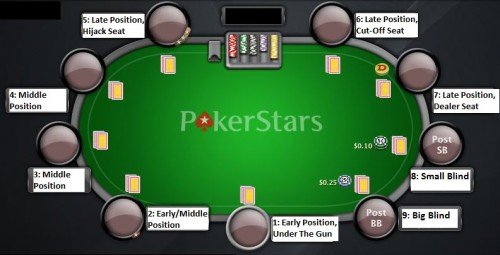1. Don't play too many hands.
One of the biggest mistakes beginners make is playing too many hands. Don't be fooled by the idea that “any hand can win,” although this is true, some hands have much higher probabilities of winning than others.
Good hand selection is essential to becoming a winning poker player.
2. Don't bluff too much.
Another common mistake is the excessive desire to bluff. It is a misconception that to be a winning player, you need to bluff a lot. Although big bluffs are often shown in poker shows like WSOP, EPT, WPT, etc., it's important to understand that these are selected hands, and beginners often get a false impression of how often professionals bluff.
If you are a beginner in poker, it is advisable to avoid bluffing; just play your hands “straight.” For bluffing to be successful and profitable, you need to choose the right spot and opponent very carefully.
3. Think about your opponents' cards.
It is crucial to think not only about your own hand but also about the strength of your opponents' hands. Beginners often get a good card and see nothing else around them. Often, beginners get attached to pretty cards like AK, AQ, TT, JJ, and sometimes in poker, you have to fold even KK, AA when bad community cards come up. For example, if four hearts come up against three opponents, your red aces are practically dead, so you just need to let them go.
4. Play against worse players than yourself.
Although this sounds very obvious and primitive, many forget this rule. The rule is very simple: if you play against worse opponents, the money will end up in your pocket in the long run, and vice versa, if you play against better ones, your money will end up in their pockets.
There is a good poker saying: if you are the tenth best player in the world, you will still be losing if the other nine best players are at your table.
 5. Always think about your position.
5. Always think about your position.
The importance of position is often underestimated not only by beginners but also by experienced players. As Phil Ivey once said, “I would lose even to my grandmother if she always had position on me.”
The best position in poker is the last one, as you get additional information about your opponents' actions, and information in poker is crucial.
More about position: Poker position (for beginners)
6. Be attentive when you play.
The best way to gather information is simply to observe what your opponents are doing, how they behave, how much they bet, when they bet, etc. This way, you start to notice how each player plays and determine the strength of their hand based on their play. It's important to observe even when you are not in the hand, i.e., when you have folded your hand.
You will notice that players make certain moves when they have a good hand and different ones when they have a bad hand. The more information you have about your opponents, the better your chances of winning.
7. Don't jump into high limits.
There are two reasons why a beginner should play at low levels. First, the level of players at high levels is much higher, meaning your opponents will be much better than at low levels. Therefore, the chances of you beating them are very slim.
Second, you should only play at levels you can afford. You should play where you can afford to lose money. Without a good understanding of bankroll management, you will never become a good winning player, no matter how well you understand the game strategy.
More about: bankroll management (money management)
8. Don't overvalue draws.
You will often find yourself in situations where you have a “drawing hand,” where you are one card short of a good combination, such as a flush draw, straight draw, etc. Although these hands have great potential, you need to know how to play them well. If your opponent already has a good hand, you only have about a 30% chance at best. Therefore, you need to be good at calculating your winning probabilities and their ratio to the pot size.
9. Suited cards are not as good as they seem.
This is almost every beginner's mistake, overvaluing suited cards. The probability of hitting a flush when you have two suited cards is only 0.8%. And if you play with low suited cards, there is always a chance that someone has higher ones and will make a higher flush than you.
We simply recommend folding all low suited cards pre-flop, especially while you are a beginner.
To reinforce this topic, here are a few examples to help you understand the difference.
In the first example: suited 4![]() 5
5![]() against any pair, from 22 and up. In the second example: unsuited 4
against any pair, from 22 and up. In the second example: unsuited 4![]() 5
5![]() against any pair, from 22 and up.
against any pair, from 22 and up.
| Player 1: | 27.011% | 54s |
| Player 2: | 72.989% | 22+ |
| Player 1: | 22.552% | 54o |
| Player 2: | 76.659% | 22+ |
10. Know the rules.
As primitive as it sounds, you need to know the rules of the game. You need to know the values of combinations, which combination is higher than another, etc. You cannot be a winning player without knowing the rules.
Importantly, some other poker games (e.g., Omaha, 7 card stud, limit, pot limit, etc.) or tournaments (e.g., rebuy, knockout, etc.) have specific rules, so always find out the rules before you start playing.
Source: http://www.thepokerbank.com






